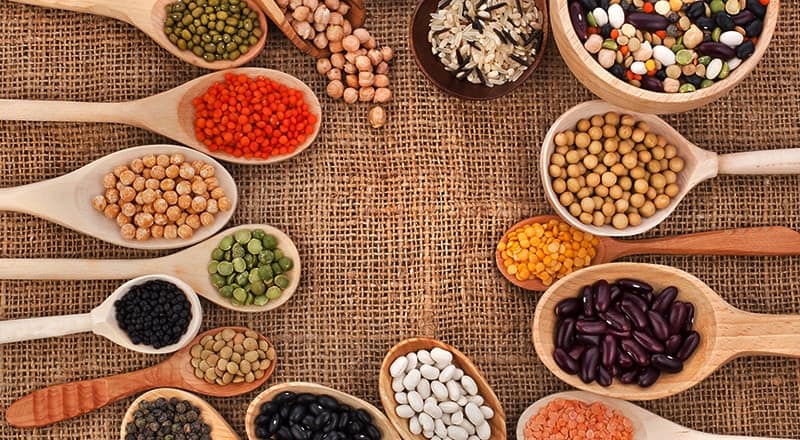Starch You Don’t Have to Resist

Starch You Don’t Have to Resist
“Starch”, “carbs”, they have sort of becoming dirty words. We equate them with white bread, pasta, and cookies, resulting in weight gain, diabetes, and other degenerative diseases. When I lecture about the care and feeding of a healthy body, I make it a point to stress that all carbs are not created equal.
Simple carbs are a group containing sugar, white flour, and other refined grain products.
Complex carbs, on the other hand, include vegetables, fruits, beans, legumes, and whole grains.
They may both be called “carbs” but they couldn’t be more different in how they affect your health. The word “simple” refers to the carbohydrate being easily digested by your body. It’s so refined the body has to exert little effort to break it down, resulting in spikes of blood sugar followed by crashes, resulting in cravings, weight gain, and a movement towards degenerative disease.
“Complex” carbs on the other hand require a great deal of enzymatic “energy” on the part of the body to digest. These carbs really take some time and effort to break down, which is good. Further, such carbs are rich in fiber making them extremely healthy as a fuel source for the good bacteria in your gut, not to mention providing cancer-fighting properties.
There’s another “face” to starch you should know about; it’s called resistant starch and it provides huge health benefits. Resistant starch is found in our favorite complex carbohydrates and it literally “resists” the body’s carbohydrate busting enzymes. This allows it to take a ride all the way to the end of the large intestine where it, along with healthy fiber in the diet, feeds the good bacteria and provides anti-cancer properties in the lower colon where cancerous tumors tend to form.
Specifics on optimizing the effects of resistant starch in your day to day diet follow:
1. Heating and cooling foods can increase the amount of resistant starch they contain. This wasn’t much of an increase in grains or starchy potatoes (think cold pasta salad or potato salad), but when it came to beans it was pretty impressive. Imagine you cook garbanzo beans and then they cool before you eat them. Or imagine you’ve cooked them, they’ve cooled in the fridge and then you heat and cool them again as leftovers. Such re-heating and cooling increase their resistant starch pretty dramatically – doubling it in fact. Lentils too saw a nice increase of almost double.
[Note: check out my sprouted lentil salad or lentil soup recipe, and remember you can throw beans on pretty much anything!]
2. Berries, especially raspberries and strawberries act as starch blockers. Raspberries “won” the prize in this regard with their presence completely inhibiting the enzyme used to digest starch. It may sound odd to inhibit an enzyme, but remember we are aiming to keep starch intact such that it can feed the good bacteria low down in the gut. These are the very bacteria that keep our immune system strong, reducing the risk of most diseases across the board.
3. It turns out processing, or rather lack thereof, made a large difference in how effective foods of a complex carb origin were in making it down to the good bacteria of the large intestine intact.
In a study, whole grains and beans were given in two different forms: whole and ground. The difference would be between eating whole garbanzo beans on a salad vs. eating the same beans ground into hummus. It’s exactly the same food, the only difference is whole vs. ground.
You just wouldn’t think it would make that big a difference (at least I didn’t!), but it absolutely did. The whole food yielded stool double in size. More of the resistant starch made it down to the good bacteria, who snacked on the starch and doubled the size of the stool. They bulked up the stool, softened it, lowered the pH (acidic is what you’re going for to prevent cancer), and increased short-chain fatty acid production. The British Medical Journal reported in September 2015 short-chain fatty acids are produced by the bacteria in the colon as a result of consuming a diet high in fiber. Short-chain fatty acids are protective against cancer, diabetes, and heart disease.
In hindsight, it does make sense from the perspective of simple and complex. Of course, a whole bean or whole grain is going to take more effort and time to digest than its ground version. The mechanical grinding of the food has performed some of the work for the body. Requiring the body to do all the work results in a much healthier bowel picture and much happier good bacteria.
Happy bacteria (you have about 100 trillion of them!) make for a healthy immune system plus helps prevent cancer, so it’s well worth the effort to feed them well.
You may be excited to see pre-packaged foods “enriched” with resistant starch in your grocery store – don’t be! Why not? Mother Nature just doesn’t like to be fooled. We may enjoy high tech gadgets in our lives, but our bodies enjoy a simple life. When the resistant starch powder was added to “junk food” (basically a simple carb) it created no health benefits. It was theorized the fiber attendant with naturally resistant starch foods was likely needed to push the resistant starch down its long road to the end of the colon. Taking a refined product and throwing some resistant starch powder on it didn’t “cut it” – no benefits were seen. Do you see what I mean about not being able to fool Mother Nature?
The studies providing this data included the Journal of the Science of Food and Agriculture (2015), Asia Pacific Journal of Clinical Nutrition (2003), and International Journal of Food Sciences and Nutrition (2009), which are current and all food-based scientific journals. Isn’t it amazing how often we come back to the basics of needing more fruits, vegetables, beans, and legumes in order to optimize our health?
Keep it simple (or shall I say complex?!) and enjoy real food. Your friends in your gut will appreciate it and they will keep you healthy for feeding them so well!
Do you need help with your health?
We have the diagnostic and testing tools, the clinical experience, and a different medical approach to discovering the root cause of why you have the symptoms that are bothering you. As long as you are ready to make some dietary and lifestyle changes, we can help you. We will "hold your hand" through the changes, step by step, to make each step an easy one. We are located in Clearwater, FL, at 1000 S Ft Harrison, at the corner of Ft. Harrison Ave. and Magnolia St. There is plenty of parking space directly accessible from Ft Harrison. If it is not convenient for you to come to Root Cause Medical Clinic, we offer telehealth/telemedicine consultations to residents of certain states. Call us for details.
Contact us for a Consultation – Call 727-335-0400

Dr. Vikki Petersen DC. CCN
Founder of Root Cause Medical Clinic
Certified Functional Medicine Practitioner
Dr Vikki Petersen is a public speaker, author of two books, several eBooks and creates cutting edge content for her YouTube community. Dr Vikki is committed to bringing Root Cause Medicine and its unique approach to restoring health naturally to the world.
Ask a Doctor
Have a health concern you'd like to speak with a doctor about? Or just want clarity on a subject? Ask Us!
Featured Articles
Popular Stories
References:
- Nutritionfacts.org, Dr. Michael Greger
P Raigond, et al. Resistant starch in food: a review. Journal of the Science of Food and Agriculture. 2015 Aug 15;95(10):1968-78. - B S Yadav, et al. Studies on the effect of multiple heating/cooling cycles on the resistant starch formation in cereals, legumes, and tubers. International Journal of Food Sciences and Nutrition. 2009;60 Suppl 4:258-72.
- D Grussu, et al. Berry polyphenols inhibit α-amylase in vitro: identifying active components in rowanberry and raspberry. Journal of Agricultural Food Chemistry. 2011 Mar 23;59(6):2324-31.
- G P Young, et al. Resistant starch and colorectal neoplasia. Journal of AOAC International. 2004 May-Jun;87(3):775-86.
- A L Hovey, et al. Whole cereal and legume seeds increase faecal short-chain fatty acids compared to ground seeds. Asia Pacific Journal of Clinical Nutrition. 2003;12(4):477-82.


